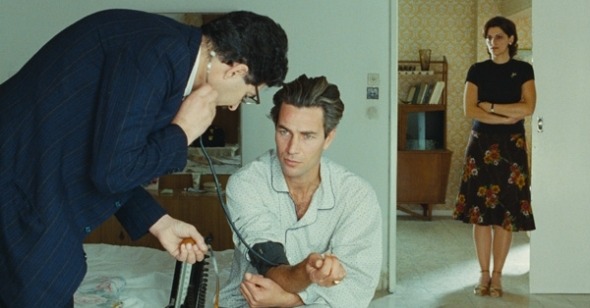Years of Refusal
By Michael Koresky
The Time That Remains
Dir. Elia Suleiman, Israel/UK/Italy/Belgium, IFC Films
Elia Suleiman’s deadpan finds its motivation in The Time That Remains. Structured in four parts, the self-identifying-Palestinian actor-director’s latest film, like his previous ones, straddles the line between sobriety and whimsy in its evocation of the absurdity of the contemporary Israel-Palestine reality—perhaps not without effort, but also not without a great degree of artistic success. For his third feature he once again mounts his film as a series of elegantly composed static frames, casting himself as a dead-eyed, immobile, silent punch line. His status as little more than prop is validated in the film’s beginning sequence, when he is the passenger in a stranded, rain-drenched taxi cab, sitting speechlessly, blurred in the back seat, barely noticeable in the frame at first. Yet that opening is instructive: Suleiman will here take a back seat to the narrative as well. Though he doesn’t forgo his well-honed, detached, super-realist style, Suleiman this time applies it to an expansive historical narrative, using his parents’ experiences (and specifically his father’s diaries) as the basis for a poignant evocation of decades of living as Arab minorities in Israel. The film begins in 1948, during the Arab-Israeli war and subsequent occupation, and traces across 1970 and 1980, finally landing in present day. And when the camera finally winds up trained again on Suleiman’s mordant, still visage, his overdetermined immobility, which in the past always seemed as though it were angling for Tati territory, feels earned, a tragic acquiescence.
What’s most remarkable, and melancholy, about this revelation is that the story of Elia’s father, Fuad, begins as one of invigorating resistance. The rest of The Time That Remains is a slow, sad seeping out of assertiveness and will, an anti-action film that sustains a reverse trajectory from most other historical dramas. That Suleiman manages his usual brand of restrained humor throughout is a feat, especially amidst such beautifully poised images of social decay, captured by his trusty DP, Marc-André Batigne. The film is oddly resplendent in scene after scene, whether we’re looking intently at a shaded grove of olive trees or a neon-dotted cityscape, providing a sharp contrast to the dashed hopes of its characters. One of its great beauties is also one of its best jokes: Fuad is embodied by stunningly handsome Israeli-Arab actor Saleh Bakri, the virile, matinee-idol counterpart to Suleiman’s stoop-shouldered son, named, of course, Elia. The progression from action to resignation, from promise to deterioration, is visually mirrored in the journey from Bakri, upright and comely, to Suleiman, shrunken and spooked.
Chronicle of a Disappearance, Suleiman’s 1996 feature debut, and Divine Intervention, his 2002 festival darling, both took the form of elliptical blackout sketch comedy, made up as they were of disconnected vignettes that surveyed with the darkest humor the instability of contemporary Israel, and particularly the mundane realities of supposed enemies living side by side, spotlighting situations so tense you just have to laugh. Until now, Suleiman’s approach has been tableaux-based: with their single long takes, unmoving cameras, and barely expressive performers, these films clearly and neatly have fit in with a certain type of contemporary art cinema (a sort of rigorous minimalism) that has found echoes in work from Wes Anderson to Roy Andersson and, with less gags, Lisandro Alonso or Michael Haneke. The Time That Remains treads similar territory, but takes us somewhere new. Its narrative tends toward compartmentalization but only in a way that occasionally stutters its linearity. History trudges on, he acknowledges, however much it holds us back.
Set in Nazareth, known as the Arab capital of Israel, where the director grew up, the film tracks Fuad’s inexorable decline with matter-of-fact grimness. Bakri’s aging makeup may not be convincing (some grey highlights barely mask the youthful bravado beneath), but there’s a moving, definitive sense of time passing with each fade-in from the previous section. Suleiman is most incisive in his early scenes of the occupation, evoking with a few short strokes the confusion and absurdity of war and the quickly squashed retaliation of the few militant holdouts. Here, Fuad is a dashing soldier, fighting the incursion with stern commitment; soon, following an expertly staged long take in which he is literally tossed off like scrap metal by occupying soldiers, Fuad will dissolve into an ashen family man, fully domesticated and of precarious health, dealing with extreme neighborhood headaches (like repeatedly having to stop his blustery, elderly neighbor from lighting himself on fire in the street) and finding solace in nighttime fishing (which inadvertently, and unpredictably, leads to his further decline). Meanwhile, the family ages, especially the increasingly inward Aunt Olga (Isabelle Ramadan), a quiet casualty; and little Elia simply watches on with haunted stares.
By the time Suleiman shows up as his grown self to enact his practiced sad clown routine, one may be taken aback by his presence, as the significant tonal shift he heralds creates a temporary dissonance—between the film’s more empathetic earlier scenes and its aloof, open-ended denouement. Yet by making a film based on his and his parents’ memories, Suleiman has created backstory not only for himself but also for, implicitly, every grave character he has embodied. Neither here nor there, Elia and his family are like castaways, lost, or at least invisible, in the tidal wave of history; and Suleiman looks as though he hasn’t come up for breath in years. There’s no final grace note to this unforgiving portrait of immobility (nor is there a fantasy catharsis, as in Divine Intervention), yet Suleiman still manages to exude an overall tone of benevolence—perhaps because its multigenerational dialogue feels like some sort of personal, rather than political, reconciliation.
